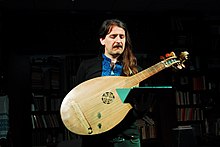Taras Kompanichenko

Taras Wiktorowytsch Kompanitschenko ( Ukrainian Тарас Вікторович Компаніченко . Scientific transliteration Taras Viktorovyč Kompaničenko * 14. November 1969 in Kiev ) is a Ukrainian Kobzar (folk singer), Kobsa - Bandura - and hurdy-gurdy player and director of the ensemble Chorea Kozacka .
biography
Taras Kompanitschenko comes from a Cossack family originally living in Hluchiw , whose members suffered several times under Soviet rule due to deportations to Arkhangelsk in northern Russia and other restrictions that shaped the following generations. Both parents were scientists, the father a physicist, the mother a chemist. After finishing the music school with a focus on Bandura, he attended the Technicum for Decorative Art in Kosiv in the Ivano-Frankivsk Oblast and the Lviv Academy for Portrait Art from 1990–1992 , and from 1992–1994 he worked in Kiev at the Museum of Folk Architecture and Customs Ukraine . In 1999 he graduated from the Kiev Art Institute. 1999–2000 he was the first representative of the All-Ukrainian Association of Bandura Players, and since 2011 he has been a research assistant at the Kiev Museum of Books and Printing .
plant
Member of the Kobsar Players' Guild since 1989, Kompanitschenko began recording songs from the riflemen and insurgents in the late 1980s. He learned to play various folk instruments: bandura, Cossack lute, lyre, hurdy-gurdy, bagpipe, shawm. At the same time, inspired by the treasure trove of songs handed down from his grandmother, he began to search archives and private collections for old songs that he would bring back to performance. After completing his training as a decorative artist, he was able to focus more on music and soon turn his first passion into a profession. He studied with a number of outstanding Ukrainian folk musicians. In 2005 he founded the ensemble “Chorea Kozacka”. He makes music together with other ensembles. His repertoire includes many genres: Psalms, Dumas (epic songs), old songs from the Lavra of Pochaiv , Christmas (Koljadky), ballads, romances and its own theme of classic Ukrainian authors works. His appearances take place mainly in Ukraine. The musician and his ensemble were particularly committed to the Orange Revolution of 2004 and the Euromaidan 2013–2014, as well as the subsequent social activities in which he volunteered. The musician is also known for his concerts in Lithuania, Poland, Switzerland and Germany.
characterization
Kompanichenko is one of the most important contemporary musicians who cultivate traditional Ukrainian music. In a certain way he is the persistent, traditionally masculine Kiev equivalent of the much more experimental, reinterpreting and sometimes only vocal, sometimes with Ukrainian atypical instruments such as the Indian harmonium playing Mariana Sadovska from Lviv .
family
Kompanichenko is married to Nina Burmistrova, with whom he has four children.
Awards
- 2003 Laureate of the national H. Kytastyj Kobsar competition
- 2004 Vasyl Stus Prize
- 2008 Merited Artist of Ukraine
Recordings
- Kobsarsko-liryčna tradicija. 2002.
Further recordings with the ensemble from 2009.
Web links
- Biography and song list of Taras Kompanichenko (Ukrainian)
- Taras Kompanichenko website (Ukrainian)
literature
- BM Žeplyns'kyj, Art. Kompaničenko, Taras, in: Encyklopedija sučasnoï Ukraïny 14 (2014) 213f.
- Chto je chto v Ukraïni 2007, 458.
| personal data | |
|---|---|
| SURNAME | Kompanichenko, Taras |
| ALTERNATIVE NAMES | Kompanichenko, Taras Viktorovych (full name); Компаніченко, Тарас Вікторович (Ukrainian) |
| BRIEF DESCRIPTION | Ukrainian musician, ethnomusicologist |
| DATE OF BIRTH | November 14, 1969 |
| PLACE OF BIRTH | Kiev |

